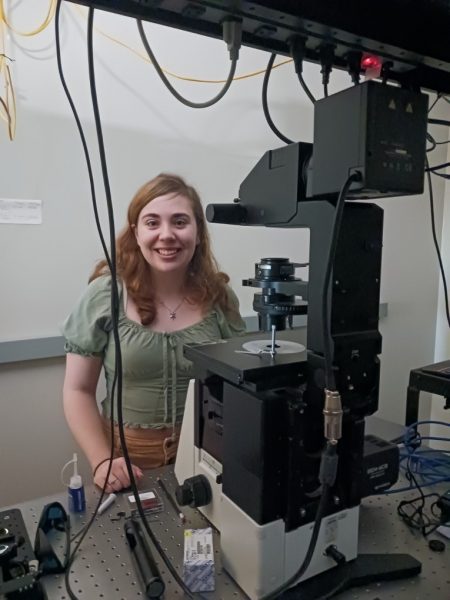Bethany Hellman graduated in the Spring of 2022 with a Bachelor of Science degree in Physics. She was an inaugural recipient of The Elizabeth Henes Memorial Award for outstanding undergraduate women in physics. Bethany was a member of the Society of Physics students throughout her time at Michigan Tech, worked as a coach at the Physics Learning Center, and performed experimental research with the guidance of Professor Jacek Borysow.
In your time at Michigan Tech, what was it like to be a member of the Physics Department?
I think the best part of the physics department at Tech is the close-knit nature of the department. Right from the start of my undergraduate degree, we developed good study strategies and worked together to get through our classes. This cooperation built good team working skills as well as helped with individual understanding of the material. Additionally, it is easy to talk to and connect with the professors, and it helps make the department feel less intimidating. The opportunities for travel, whether it be to visit labs and colleges or to attend conferences, really helped integrate me into the STEM community and get a feel for what the field is like and what the field is doing. While it is hard, there were definitely moments where I felt I was getting a good college education.
Can you talk a little bit about your senior research project and what it was like to get hands-on experience in the lab?
My senior research involved laser engineering, and I don’t think we praise the hands-on experience enough. It is one thing to learn about the theory and see it all work out nicely on a chalkboard, but when it comes time to do something with that information you need to learn a new set of skills that is unrelated to what we learn in a classroom. Only by fine tuning the transmission through a fiber optic cable and slightly adjusting a mirror to find the perfect spot did I learn that optics requires a lot of patience and fine motor skills. I knew in theory that I needed my seed laser to hit the gain medium of the semiconductor laser, but in practice that gain medium is on the order of micrometers in size; learning how to actually align the optics to get there required trial and error. I honestly loved the research I was doing, and the freedom I had to figure it out on my own helped me develop an independence when it comes to research. I learned how to read manuals, how to troubleshoot, and how to look for other sources on the web when I had a question to answer. It is truly one of the most valuable aspects of my undergraduate degree.
Do you feel like this experience helped you in your search for graduate schools?
It definitely did. My research opened my eyes to the field of optics and photonics, and when I applied to graduate school I have no doubt the research I had helped me get accepted into the program I’m in now. It also helped me figure out what exactly I wanted from a graduate program; I really enjoyed the hands-on activity, and after visiting two universities I decided on the one that had a building full of labs instead of classrooms. It has also helped prepare me for graduate level research, which requires a lot of self direction, and it helped develop a base of skills for working in a lab.
What is it that you are doing now?
Currently I am working with Dr. Han in his Optical Nanoscopy Lab while pursuing my doctorate in Optics and Photonics at the University of Central Florida. The focus of the lab is super resolution fluorescence microscopy, although currently I am working on phase imaging microscopy (more specifically quadriwave lateral shearing interferometry, or QLSI). As such, I am working on a microscope setup with an LED light source and a camera with a diffraction grating, and down the road I aim to improve the resolution of the setup. It requires learning a lot of new skills, like how to prepare a bead sample or a DNA sample for viewing, a lot of optics, and some coding.
Do you have any advice or words of wisdom for those who are thinking of becoming a physics major?
I think the most important thing to keep in mind is that you learn very applicable skills in physics. It is tough for sure, but with a little perseverance the most important thing you will learn is how to learn. You will learn how to find the answer to your own questions and how to properly understand the information you need. You will learn patience, because I don’t believe it comes easily to any of us, and it may take several times to fully understand a concept. With these skills however, there isn’t anything you can’t learn, and that opens a lot of doors.
